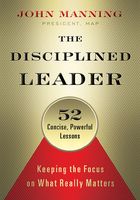
Part I
Where You Must Start
The Responsibility to Lead Yourself
The journey to becoming a Disciplined Leader, one whose understanding and focus on The Vital Few drives the success of its people, must start with you. Before you make strides to impact your team and organization, it’s part of your leadership responsibility to hold up the mirror and peer honestly and deliberately at yourself, reflecting on how you’ve led others.
You do that by examining your values and beliefs. You assess your traits that enhance or deflect from your leadership capabilities, paying attention to what you’ve been good at and not so good at in the past. You also recognize what you really cherish and are passionate about in your career and outside of work. You gain understanding of how your personal and professional lives interconnect and serve one another, and what the balance between the two look like at the end of the day.
Why go to all this effort? Because if you don’t know these things about yourself and understand how they impact your ability to lead effectively, it will be impossible to understand how to make the right changes in your leadership—the ones that inspire you, your team, and the organization as a whole to act and deliver results.
Some years back, I was managing a business unit with three hundred employees (including fifteen managers), working seventy-hour weeks, and overlooking the importance of caring for myself. I started skipping healthcare check-ups and missing routine appointments. I wasn’t eating healthy and failed to exercise and get adequate sleep. All these oversights and bad habits started creating stress and wreaking havoc on my personal and professional life. I found myself exhausted and run down physically, emotionally, and mentally. Then, after a few back-to-back wake-up calls, I suddenly realized a powerful truth: If I wanted to succeed in both my personal and professional life, I had no choice but to change my ways. So I did, and it has made all the difference.
Now perhaps you’re thinking this is just pure common sense. But how many of us have had times when we’ve put the business ahead of ourselves? Not caring for our self—ignoring the importance of health, fitness, and wellbeing—is indicative of that classic personal-professional imbalance.
At MAP, we see this happening with leaders all the time—it’s one of the most common reasons why company executives and managers suffer emotionally, mentally, and physically. The fallout then hurts everyone and everything in these leaders’ paths.
But addressing this and other leadership “sins” of the self is easier said than done. It requires acute personal discipline, a fervent willingness to change, the ability to implement corrective action, and the relentless commitment to adopt new mindsets and habits.
Here, in this part, you’ll find a collection of nineteen hearty tips that can stand alone and support you in your job to lead yourself. You’re free to cherry-pick and read the ones that stand out to you initially if you wish. But if you can, read them all—start to finish, beginning to end. They are presented in a logical, sequential order, a sort of natural path of inspiration, empowerment, exploration, challenge, and insight that aligns with practical, commonsense coaching. But you’ll find that they all demand your attention because developing your own personal leadership is the bedrock upon which your other two leadership responsibilities are built. Your personal leadership competency is the base of everything else you do to lead your team and organization.
As outlined in the introduction, this book provides a process for helping you identify your Vital Few. So when you read through these tips, highlight those subjects that trigger emotion, spark a fire, or simply stand out because your gut is telling you it’s time to work on them. Perhaps identify ten or fewer because at the end of the part, you’ll then choose your “Top Three” Vital Few—those mindsets and habits you will focus on to accelerate your ability to lead yourself.